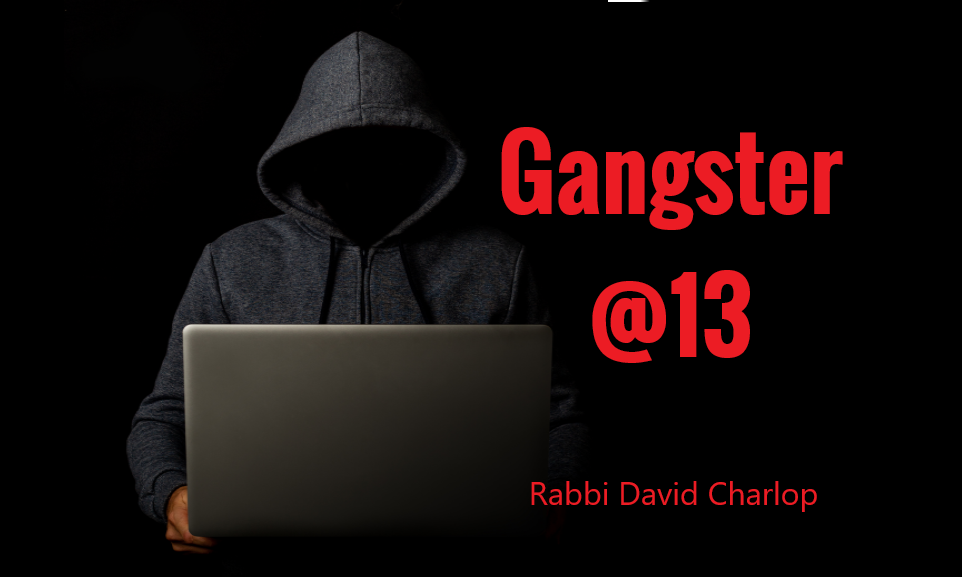
Ki Teitzei: Gangster@13
Why does the wayward Bar Mitzvah boy - the ben sorer - deserve such a stiff penalty? He wants to live a gluttonous lifestyle while still being "religious"...

Mazal tov to the new Bar Mitzvah boy! It’s a wonderful time for the family and, hopefully, for the young man himself. But what’s this? The new Bar Mitzvah boy seems to be less than excited about coming of age. Not only that, but he appears to be getting himself into some trouble. It’s hard to believe but he stole from his parents and took their money to buy a feast of meat and wine. If he had a website, he’d call it gangster@13.com!
This is the beginning of an important story – ben sorer, the rebellious son – in this week’s Torah reading.
We’ll continue the saga of the wayward young man in just a minute. Before we retell the Torah’s tragic ending of this young man, it’s important to know that according to the majority opinion in the Talmud, the story, as described by the Torah, never took place! Honestly, it seems a little strange that the Torah would elaborate on a situation that never happened.
If it never occurred , what lesson is so essential that the Torah included it?
Let us return to the story. The young man is given corporal punishment for his deviant behavior and then  warned by the court not to continue on his wayward path. Unfortunately, even after this severe rebuke, he continues in his wanton ways. He steals again from his parents and continues with his indulgent lifestyle. This time the Torah says there is no hope for him and that he will ultimately end up becoming a thief and a murderer. Based on this grave and real concern, he is given the death penalty.
warned by the court not to continue on his wayward path. Unfortunately, even after this severe rebuke, he continues in his wanton ways. He steals again from his parents and continues with his indulgent lifestyle. This time the Torah says there is no hope for him and that he will ultimately end up becoming a thief and a murderer. Based on this grave and real concern, he is given the death penalty.
As mentioned before, for numerous reasons this scenario never could have occurred. If so, what are we supposed to learn from the episode in terms of both our children and ourselves? Also, why is this young man’s punishment so severe? Is the crime of stealing and gluttony cause for capital punishment? Aren’t we aware of many young people who are acting improperly even at such a young age?
To answer our questions, I would like to share some thoughts of my Rabbi, Rabbi Ezriel Tauber. He points out that one of technical requirements necessary for this story to occur is that all of these delinquent acts must take place between the age of thirteen until thirteen and a half. Based on specific verses, the Talmud indicates that if this aberrant behavior takes place before or after these times the young man is not punished. What is so unique about that time period that he is held accountable only then?
Many of us are aware that a boy becomes responsible for his actions at age thirteen, which is the time of his Bar Mitzvah. At that juncture, he needs to realize that not only is he obligated to perform specific commandments but also to develop a sense that he is beginning his life’s journey to becoming a contributing member of society and a proud representative of Hashem in this world.
Our wayward Bar Mitzvah boy stole from his parents and ate kosher meat and wine. His gluttony is not, per se, the problem since all of actions could be justified. He’s wouldn’t receive the death penalty if he stole from someone else or even if he ate non-kosher meat or wine. By stealing from his parents he will rationalize his offense. “My parents won’t really mind, and, anyway, I’ll pay them back.” By eating and drinking kosher food, he’ll feel assured he isn’t doing anything wrong. His thinking and his transgressions are, in fact, very serious. What he is doing is using the Torah for his own selfish purposes. It’s a gluttonous lifestyle while still being “religious”. If he eats non-kosher or steals from someone besides his parents, he can’t fool himself that what he’s doing is acceptable.
Hopefully at some point, he will get a hold of himself and start living a moral and honest lifestyle. But if everything he’s doing is “kosher”, a self-serving lifestyle with “a Rabbinic stamp of approval”, his chances of realizing his errors are next to none. That is why specifically at the age of Bar Mitzvah this story takes place. At this pivotal junction in his lifetime, the young boy becoming young man must know that he can be a 100% “Kosher” Jew while living a lifestyle that will take him 100% away from Hashem.
The Torah says that since this young man will never reach his purpose in this world and, ultimately, he will start damaging others, it’s better he should be punished by the court before he starts doing something much more serious.
Again, dear reader, let me remind you that this story never was nor hopefully never will be happen. Even so, its lessons are very relevant. Being a true Jew doesn’t mean just keeping the proscribed obligations. It is essential to honestly analyze ourselves to know if we are traveling on a road which takes us closer or further from our Father in Heaven. Even if we eat the most kosher food and appear to be religious, our true yearnings can lead us far from who were are and we are supposed to be. May Hashem help our Bar Mitzvah boys, their families, and all of us to develop and maintain a clear picture of what living an honest Jewish life is all about.










8/15/2013
Your beloved child in Galus He doesn't deserve the death penalty because whomever had instructed this bar mitzvah obviously did not do so in a way that showed him the warmth of love of Judaism, the aspect attached to his soul. Furthermore the child never will have the free will to live a future explarly life that shows he never would have committed a sin. If the child knew that HaShem needed him, he never would have strayed. A child must be taught in his or her way and in this case, the teacher simply failed.
8/15/2013
He doesn't deserve the death penalty because whomever had instructed this bar mitzvah obviously did not do so in a way that showed him the warmth of love of Judaism, the aspect attached to his soul. Furthermore the child never will have the free will to live a future explarly life that shows he never would have committed a sin. If the child knew that HaShem needed him, he never would have strayed. A child must be taught in his or her way and in this case, the teacher simply failed.